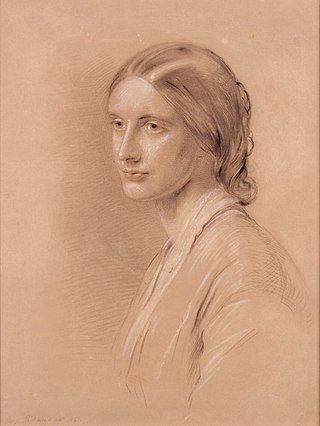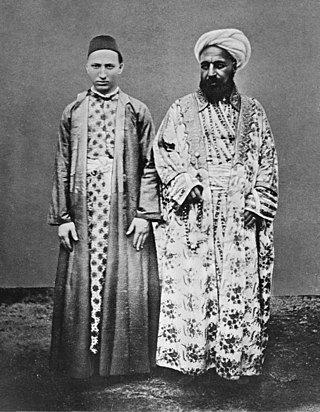
Sexual slavery and sexual exploitation is an attachment of any ownership right over one or more people with the intent of coercing or otherwise forcing them to engage in sexual activities. This includes forced labor that results in sexual activity, forced marriage and sex trafficking, such as the sexual trafficking of children.

Anti-Slavery International, founded as the British and Foreign Anti-Slavery Society in 1839, is an international non-governmental organisation, registered charity and advocacy group, based in the United Kingdom. It is the world's oldest international human rights organisation, and works exclusively against slavery and related abuses.

Child prostitution is prostitution involving a child, and it is a form of commercial sexual exploitation of children. The term normally refers to prostitution of a minor, or person under the legal age of consent. In most jurisdictions, child prostitution is illegal as part of general prohibition on prostitution.

Josephine Elizabeth Butler was an English feminist and social reformer in the Victorian era. She campaigned for women's suffrage, the right of women to better education, the end of coverture in British law, the abolition of child prostitution, and an end to human trafficking of young women and children into European prostitution.

Sex trafficking is human trafficking for the purpose of sexual exploitation. It has been called a form of modern slavery because of the way victims are forced into sexual acts non-consensually, in a form of sexual slavery. Perpetrators of the crime are called sex traffickers or pimps—people who manipulate victims to engage in various forms of commercial sex with paying customers. Sex traffickers use force, fraud, and coercion as they recruit, transport, and provide their victims as prostitutes. Sometimes victims are brought into a situation of dependency on their trafficker(s), financially or emotionally. Every aspect of sex trafficking is considered a crime, from acquisition to transportation and exploitation of victims. This includes any sexual exploitation of adults or minors, including child sex tourism (CST) and domestic minor sex trafficking (DMST).

White slavery refers to the enslavement of any of the world's European ethnic groups throughout human history, whether perpetrated by non-Europeans or by other Europeans. Slavery in ancient Rome was frequently dependent on a person's socio-economic status and national affiliation, and thus included European slaves. It was also common for European people to be enslaved and traded in the Muslim world; European women, in particular, were highly sought-after to be concubines in the harems of many Muslim rulers. Examples of such slavery conducted in Islamic empires include the Arab slave trade, the Barbary slave trade, the Ottoman slave trade, and the Black Sea slave trade, among others.
Forced prostitution, also known as involuntary prostitution or compulsory prostitution, is prostitution or sexual slavery that takes place as a result of coercion by a third party. The terms "forced prostitution" or "enforced prostitution" appear in international and humanitarian conventions, such as the Rome Statute of the International Criminal Court, but have been inconsistently applied. "Forced prostitution" refers to conditions of control over a person who is coerced by another to engage in sexual activity.

Prostitution is a type of sex work that involves engaging in sexual activity in exchange for payment. The definition of "sexual activity" varies, and is often defined as an activity requiring physical contact with the customer. The requirement of physical contact also creates the risk of transferring infections. Prostitution is sometimes described as sexual services, commercial sex or, colloquially, hooking. It is sometimes referred to euphemistically as "the world's oldest profession" in the English-speaking world. A person who works in the field is usually called a prostitute or sex worker, but other words, such as hooker and whore, are sometimes used pejoratively to refer to those who work in prostitution. The majority of prostitutes are female and have male clients.

The United Kingdom (UK) is a destination country for men, women, and children primarily from Africa, Asia, and Eastern Europe who are subjected to human trafficking for the purposes of sexual slavery and forced labour, including domestic servitude. In 2012 it was ranked as a "Tier 1" country by the US Department of State, which issues an annual report on human trafficking. "Tier 1" countries are those whose governments fully comply with The Trafficking Victims Protection Act's minimum standards for the elimination of trafficking. The TVPA is a federal statute of the United States.

Human trafficking is the trade of humans for the purpose of forced labour, sexual slavery, or commercial sexual exploitation.
Transnational efforts to prevent human trafficking are being made to prevent human trafficking in specific countries and around the world.
The International Agreement for the suppression of the White Slave Traffic is a series of anti–human trafficking treaties, specifically aimed at the illegal trade of white people, the first of which was first negotiated in Paris in 1904. It was one of the first multilateral treaties to address issues of slavery and human trafficking. The convention held that human trafficking was a punishable crime and that the 12 signatories should exchange information regarding human trafficking operations.

Sex trafficking in the United States is a form of human trafficking which involves reproductive slavery or commercial sexual exploitation as it occurs in the United States. Sex trafficking includes the transportation of persons by means of coercion, deception and/or force into exploitative and slavery-like conditions. It is commonly associated with organized crime.
Although prostitution in Morocco has been illegal since the 1970s it is widespread. In 2015 the Moroccan Health Ministry estimated there were 50,000 prostitutes in Morocco, the majority in the Marrakech area. Prostitutes tend to be Moroccan women from lower socioeconomic backgrounds as well as migrants from sub-Saharan Africa, many of whom are victims of human trafficking UNAIDS estimated the figure at 75,000 in 2016.
Sex trafficking in China is human trafficking for the purpose of sexual exploitation and slavery that occurs in the People's Republic of China. It is a country of origin, destination, and transit for sexually trafficked persons.
Cybersex trafficking, live streaming sexual abuse, webcam sex tourism/abuse or ICTs -facilitated sexual exploitation is a cybercrime involving sex trafficking and the live streaming of coerced sexual acts and/or rape on webcam.

Slavery has existed in various forms throughout the history of Nigeria, notably during the Atlantic slave trade and Trans-Saharan trade. Slavery is now illegal internationally and in Nigeria. However, legality is often overlooked with different pre-existing cultural traditions, which view certain actions differently. In Nigeria, certain traditions and religious practices have led to "the inevitable overlap between cultural, traditional, and religious practices as well as national legislation in many African states" which has had the power to exert extra-legal control over many lives resulting in modern-day slavery. The most common forms of modern slavery in Nigeria are human trafficking and child labor. Because modern slavery is difficult to recognize, it has been difficult to combat this practice despite international and national efforts.

Slavery in Egypt existed up until the early 20th century. It differed from the previous slavery in ancient Egypt, being managed in accordance with Islamic law from the conquest of the Caliphate in the 7th century until the practice stopped in the early 20th-century, having been gradually phased out when the slave trade was banned in the late 19th century.
The International Bureau for the Suppression of the Traffic in Women and Children (IBSTWC), also known as only the International Bureau, was a British organization, established in London in 1899. Its goal was to combat human trafficking, specifically what was then termed as the white slave trade; the trafficking in women and children for prostitution.
The Vaksamhet was a Swedish anti-trafficking organization, founded in 1902, and active until 1946.





